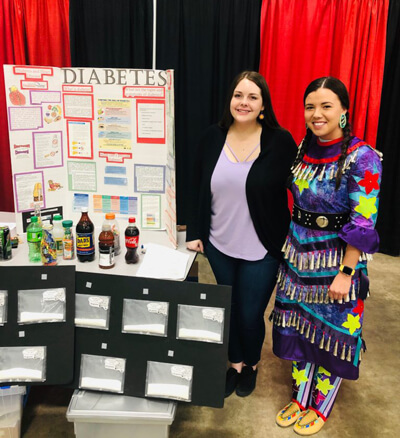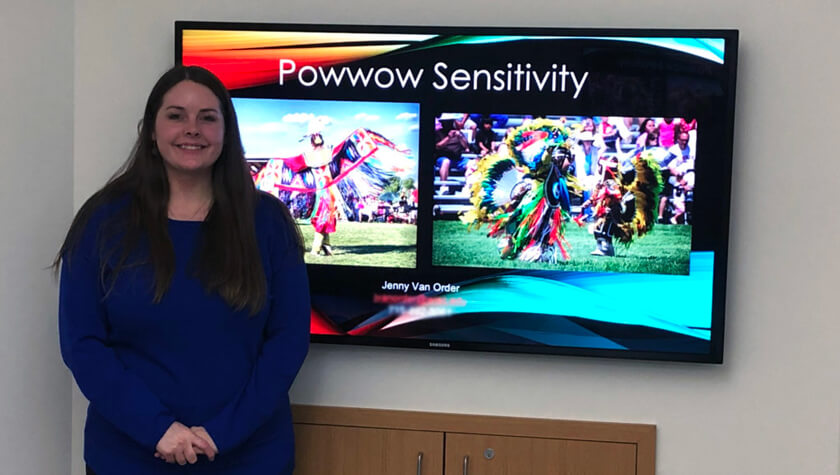
Student pharmacists receive cultural sensitivity training and provide educational resources, risks assessments, and testing to Powwow attendees
By Katie Ginder-Vogel
The drums were beating, and the bells on dancers’ regalia jingled rhythmically with their steps, as hundreds of people gathered around the dance arena and filtered through booths offering beaded jewelry, leather goods, blankets and other handcrafts at the 50th annual On Wisconsin Spring Powwow. Hosted by the University of Wisconsin–Madison and the Wunk Sheek student organization, the powwow is a showcase of traditional and modern Native American culture.
One of the booths also aimed to tackle a trend that currently plagues indigenous populations: diabetes.
“American Indians and Alaska Natives have the highest rates of diabetes in our country,” says Jenny Van Order, a second-year PharmD student at the School of Pharmacy. “Specifically, the Indian Health Service reports that American Indians and Alaska Natives have a 3.2 times higher mortality rate from diabetes, compared with all other races in the United States. This is why it is so important to spread diabetes education and prevention strategies to our indigenous populations in a culturally appropriate way and setting.”
Van Order was one of nine students from the School of Pharmacy who volunteered at the powwow through the Wisconsin Society of Pharmacy Students’ Operation Diabetes, which has one primary goal: to educate populations that have an increased risk of developing type 2 diabetes and lack access to regular health care.
“Giving our students exposure to events like these not only increases their cultural sensitivity, but also increases their awareness of the enormous impact pharmacists can have on communities who are vulnerable to certain disease states.” –Denise Walbrandt Pigarelli
Even before the day of the powwow, the pharmacy student volunteers underwent a cultural sensitivity training, hosted by Van Order, to explain powwow etiquette, Native American history, and how the health statistics correlate to lifespan and quality of life. For example, in addition to being twice as likely as non-Native people to develop diabetes, kidney failure due to diabetes is also highest among Native Americans, according to the Centers for Disease Control.
Because Native Americans have a greater chance of developing diabetes than any other racial or ethnic group in the United States, the students set up educational games to engage and educate powwow attendees of all ages.

“We have a ‘sugar’ board game where people are asked to guess which beverage matches up with baggies of sugar that have been weighed out in grams,” explains Greg Kuhlman, who co-chairs Operation Diabetes with Jess Linderud, with support from their advisor, Professor Eva Vivian. “We also have a carb counting game, where people toss a ball into a corresponding bin to represent the number of carbs in a food.”
Once visitors were engaged, they had the opportunity to talk with volunteer pharmacists, including Pharmacy Practice Division Associate Professor Denise Walbrandt Pigarelli, about medications or health concerns.
“I was there to supervise students and be on hand if there were abnormal test results,” says Walbrandt Pigarelli. “I talked with folks to determine how they were connected into healthcare; what their numbers could mean, since I wasn’t diagnosing; and suggested further action they could take with their existing health care connections.”
Walbrandt Pigarelli is hopeful that students who can volunteer at cultural celebrations like the powwow will apply the cultural sensitivity they learn from those experiences to other personal and professional situations.
She also notes the value of pharmacists and student pharmacists offering health screenings in such settings, acknowledging the costs and time sometimes required to see a health provider, get a screening, and get treatment after a diagnosis.
“It’s meaningful for pharmacists and students to be part of the initial screening process, do the risk test, and help identify if someone is at risk or has a lab value outside the normal parameters,” says Walbrandt Pigarelli. “That, plus one-on-one contact in a setting where people are comfortable, rather than a lab, is valuable on a personal, human basis, as well as an economic basis.”
Volunteers also handed out risk assessments — printed handouts with a general set of questions that were created by the American Diabetes Association. The students then offered free A1C tests to attendees whose assessments indicated they were at risk for developing type 2 diabetes.
“An A1C test requires a small blood sample from the patient, which is put into a device that analyses the amount of glucose (sugar) in the blood over the past three months,” says Linderud. “This is more accurate than a blood glucose test because it is not affected by what the patient has eaten that day.”

By all accounts, Operation Diabetes’ presence at the event added value, connecting with many attendees. About 50 people talked with the Operation Diabetes volunteers, and dozens of attendees decided to take the risk assessment and A1C tests.
“We are very lucky to have so many great volunteers and pharmacists,” says Kuhlman. “Our student volunteers were able to practice their communication skills with real patients in a learning setting, which can better prepare them for the future.”
“The School of Pharmacy supports WSPS’s many ‘Operations’ to provide education and care to people from a variety of different cultural backgrounds and beliefs,” says Linderud. For the powwow, the School also provided financial support through the Dean’s Annual Fund, which is made possible by donations from alumni and friends of the School.
“Pharmacists are often the most accessible health care provider a community has,” says Walbrandt Pigarelli. “Giving our students exposure to events like these not only increases their cultural sensitivity, but also increases their awareness of the enormous impact pharmacists can have on communities who are vulnerable to certain disease states.”
“It was such a unique and fulfilling experience to be able to bring two major parts of my life together,” says Sara Taylor, a second-year PharmD student, who both volunteered with Operation Diabetes and danced at the powwow. “We don’t get many opportunities to bring our cultural backgrounds into an academic setting, so it was really cool to be able to provide free type 2 diabetes screenings at the Wunk Sheek powwow. Dancing at the powwow this year was a really special experience for me because it reminded me of home, and I loved getting to share that with my classmates and Native American Center for Health Professions family.”
Read about another innovative program implemented by the Wisconsin Society of Pharmacy Students’ Operation Airways: a smoking cessation service.